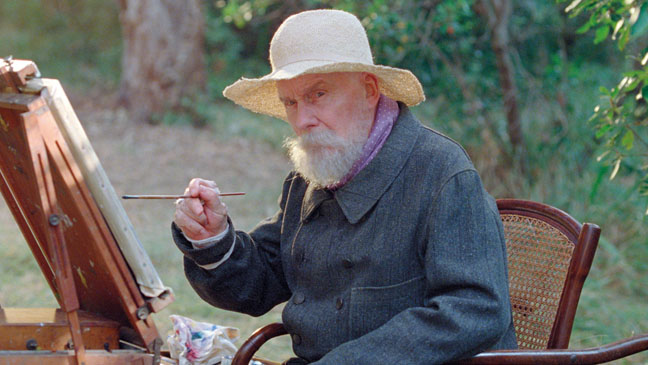Title: Renoir
Samuel Goldwyn Films
Director: Gilles Bourdos
Screenwriter: Jerome Tonnerre, Gilles Bourdos, Michel Spinosa, based on the book “Le Tableau armoureux” by Jacques Renoir
Cast: Michel Bouquet, Christa Théret, Vincent Rottiers, Thomas Doret, Romane Bohringer
Screened at: Review 2, NYC, 3/21/13
Opens: March 29, 2013
A small percentage of the world’s people have a talent so immense that the rest of us may wonder what goes on in their personal lives to shape their avocations. Many in this elite circle may have unexceptional lives not worthy of the interest of a biographer, a novelist of a filmmaker. Not so Pierre-August Renoir, who may have been genetically privileged to be one of the great Western painters. After all, his son Jean Renoir, presumably sharing in the gift, became a major filmmaker whose most celebrated offerings have been “La règle du jeu” and “La grande illusion.” As seen by director Gilles Bourdos, who looks at the painter’s final years while Renoir was in his seventies, the master did not have a charmed life in one way. He was dependent on a wheelchair, and simply opening his hand to make a fist or bending his leg caused him considerable pain. Victimized by rheumatoid arthritis, he needed to bandage his hand in order to hold a paintbrush and, unhampered by a physical handicap as was Beethoven, who penned the Ninth Symphony despite being stone deaf, Renoir continued to create impressionist magic with a canvas and some tubes of liquid paint.
“Renoir” is notable even more from the cinematic marvels of cinematographer Mark Lee Ping-bing, who is himself like a painter determined to create gorgeous scenes from the bright sunlight of France’s Cote d’Ivoire, the quality of the film stock perhaps exceeding even the machinations of the story. In fact surprisingly, Gilles Bourdos, whose “Afterwards” flirted with some non-narrative experimentation (about a divorced lawyer who comes into contact with a doctor able to predict a person’s imminent demise via a white light around the poor fellow), “Renoir” is nothing if not utterly conventional. We in the audience may be touched in part by the artist’s ability and determination to continue his passion despite serious illness, and further, we are privy to the seductive qualities of a free-spirited young woman who poses for the Great Man who, in turn, informs his son Jean that nothing in the world can equal the appeal of a young woman’s flesh.
As played by Michel Bouquet (“Toto the Hero”), himself an eighty-seven year old actor in the role of a seventy-four year old artist, the title figure has a thick goatee and a shaved head generally covered by a hat. Renoir insists on continuing to paint despite a doctor’s plea to take it easy. “I’ll paint until I collapse,” says “the boss” as the many characters in the household call him, and true to his promise he practiced his art until his death in 1919 at the age of seventy-eight. If we are to believe his younger, mischievous son Coco (Thomas Doret) the artist tended to bed his models, and no doubt Renoir would not be averse to seducing the porcelain-faced beauty, Andrée Heuschling (Christa Théret), who stopped by the spacious Renoir estate to model on the way to becoming an actress. (She would later perform in films such as the silent “Nana” under the name Catherine Hessling.)
But if the elder Renoir was no longer fit for such dalliances, his second son Jean (Vincent Rottiers), on leave from World War I with a serious leg injury, caught her eye, an attraction that was happily not unrequited. Renoir paints, Andrée poses. The son gets counseling on the beauty of women. The servants cook and bathe Renoir. Life goes on. This is to say that despite one outburst by Andrée wherein she smashes plates in the kitchen notwithstanding the worth of the Renoir-painted dishware, the principal drama occurs in the minds of the film’s occupants rather than in melodrama or serious overly expressed conflict.
For my taste, the film is too conventional, but that lack is made up by the sprightly performance of Christa Théret, the twenty-one year old actress known by the younger set for her role in “LOL,” and by the sumptuous photography. “Renoir” may get a youthful audience of students at The School of Visual Arts but otherwise it’s mostly for the older demographic, for those with an interest in acting performance, in relatively sedate French filmmaking, and especially in the beautiful colors captured by Mark Lee Ping-bing’s lenses. One can but wonder whether Seth McFarlane, watching Théret posing sans couture for the boss, would be thinking, “We saw your boobs.”
Rated R. 111 minutes © 2013 by Harvey Karten, Member, New York Film Critics Online
Story – B
Acting – B+
Technical – A-
Overall – B+

